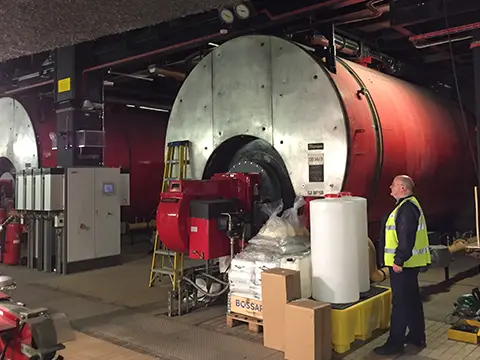ESOS Compliance and SECR Support
Energy Savings Opportunity Scheme (ESOS) and SECR Support from Chartered Building Services Engineers Discuss your projectEnergy Savings Opportunity Scheme (ESOS) and SECR Support |
Energy Savings Opportunity Scheme (ESOS) and SECR Support
The ESOS (Energy Savings Opportunity Scheme) and SECR (Streamlined Energy and Carbon Reporting) are both Government regulatory frameworks aimed at promoting energy efficiency and reducing carbon emissions, but they have different focuses and requirements.
Energy Savings Opportunity Scheme (ESOS)
- ESOS primarily focuses on energy use rather than carbon emissions. It requires large UK-based enterprises to conduct energy audits every four years to identify energy-saving opportunities within their operations, buildings, and transportation identifying energy usage.
- The audits cover energy consumption and efficiency across various areas, including buildings, industrial processes, and transport. The aim is to identify cost-effective energy-saving measures that can help businesses reduce energy consumption and costs.
- ESOS is mandatory for large businesses exceeding certain energy consumption thresholds, regardless of their sector.

Streamlined Energy and Carbon Reporting (SECR)

- SECR, on the other hand, focuses on carbon emissions as well as energy consumption. It requires eligible organizations to report on their energy use, greenhouse gas emissions, and energy efficiency measures annually in their Directors’ Report.
- Unlike ESOS, SECR applies not only to large companies but also to unquoted companies and LLPs (Limited Liability Partnerships) meeting specific criteria, making it applicable to a broader range of entities.
- SECR integrates pre-existing carbon reporting requirements with additional elements related to energy efficiency, creating a more comprehensive reporting framework.
Key Differences Between ESOS and SECR
- Focus: ESOS focuses primarily on energy use and efficiency, while SECR covers both energy and carbon emissions.
- Frequency: ESOS requires energy audits every four years, whereas SECR mandates annual reporting of energy use and carbon emissions.
- Applicability: ESOS applies specifically to large UK-based enterprises exceeding energy consumption thresholds, while SECR applies to a broader range of entities, including large companies, unquoted companies, and LLPs meeting certain criteria.
While both schemes aim to encourage energy efficiency and carbon reduction, they serve slightly different purposes and have distinct requirements. However, there’s an opportunity for companies to streamline their efforts by integrating compliance activities where possible, thereby reducing duplication of work and costs.
ESOS, or the Energy Savings Opportunity Scheme, is a mandatory energy assessment scheme in the UK aimed at reducing energy consumption and improving energy efficiency in large businesses and organizations.
Here's a breakdown of what ESOS entails:

1. Mandatory Energy Audits
- Qualifying organizations are required to conduct energy audits over a 12-month period once every four years during each compliance phase.
- These audits aim to identify opportunities for energy savings and efficiency improvements within the organization’s operations, buildings, and transportation.
2. Qualification Criteria
- Companies registered or based in the UK or with a UK establishment.
- Employing 250 people or more, or having an annual turnover in excess of £44 million and an annual balance sheet total in excess of £38 million.
- Small and medium-sized enterprises (SMEs) and public-sector bodies are generally exempt from ESOS.
3. Compliance Phases
- ESOS operates in compliance phases, with Phase 3 being the current phase.
- The compliance deadline for Phase 3 audits is 5 June 2024.
- Phase 4 is upcoming, with a compliance deadline of 5 December 2027.
- Businesses choose a 12 month cycle within a reporting period as the basis of their reporting.
4. Changes in ESOS Phase 3
- Several changes and additions have been made to ESOS Phase 3 to increase participation and enhance carbon and cost savings.
- These include standardized reporting templates, changes to exemptions, requirements for additional data collection, and the inclusion of an overall energy intensity metric.


5. ESOS Phase 4
- The UK Government has confirmed the introduction of Phase 4, expected to align ESOS thresholds with the Streamlined Energy and Carbon Reporting (SECR) framework.
- Phase 4 will focus on energy efficiency and net zero goals, with requirements for net zero plans and increased clarity on audit standards and reporting.
6. ESOS Compliance Support
- Organizations can seek assistance from ESOS consultants to navigate the scheme’s requirements, including data collation, energy audits, report preparation, and compliance verification.
7. Penalties for Non-Compliance
- Failure to comply with ESOS deadlines can result in fines, including a basic fine of £50,000 plus additional daily fines up to a maximum of 80 days.
Overall, ESOS aims to drive energy efficiency improvements and help organizations achieve carbon and cost savings, contributing to the UK’s target of reaching net zero emissions by 2050. Compliance with ESOS requirements is essential for eligible organizations to avoid penalties and contribute to national sustainability goals.
SECR, or the Streamlined Energy and Carbon Reporting framework, is a regulatory framework in the UK aimed at enhancing environmental reporting and increasing transparency regarding energy consumption and carbon emissions.
Here's a breakdown of SECR:

1. Scope and Objective
- SECR was introduced on 1 April 2019 to broaden the scope of energy and carbon reporting, making it mandatory for more UK businesses to report on their energy usage and carbon emissions.
- The objective of SECR is to put green credentials into the public domain, promote environmental transparency, and help organizations achieve the benefits of environmental reporting.
2. Who Needs to Comply
- Approximately 14,000 organizations across the UK are required to comply with SECR.
- Quoted companies of any size already obliged to report under mandatory greenhouse gas reporting regulations.
- Unquoted UK registered companies and large Limited Liability Partnerships (LLPs) meeting certain criteria.
3. Criteria for "Large" Companies
- Unquoted companies or LLPs are considered “large” if they meet at least two of the following three criteria in a reporting year: 250 employees or more, turnover of £36 million or more, or balance sheet assets of £18 million or more.
4. Key Opportunities and Benefits
- SECR presents several opportunities for organizations, including operational cost-savings through increased awareness of energy use and efficiency, differentiation from competitors, and improved performance year on year.
- By establishing robust reporting frameworks, organizations can ensure compliance, mitigate reputational risks, and contribute to the broader goal of environmental sustainability.


5. A Foundation for Environmental Reporting
- Establishing a solid environmental reporting framework involves principles such as ensuring relevance, accuracy, completeness, consistency, comparability, and transparency of reported data.
- There is no prescriptive methodology with SECR, but organizations must adopt a methodology suitable for their business needs to facilitate efficient and comparable reporting in future years.
- Businesses must report on what actions they have taken during the year to cut energy uses and emissions, but does not expect them to mention any planned or possible future actions.
- Businesses are required to include at least one energy “intensity ratio” comparing units with other metrics such as units of production.
6. Penalties for Non-Compliance
- SECR reports are included in an organization’s annual accounts submitted to Companies House.
- The Conduct Committee of the Financial Reporting Council monitors compliance, and non-compliance may result in penalties, including rejection of the report and fines for late compliance.
Overall, SECR aims to drive environmental transparency, encourage energy efficiency, and support organizations in their efforts to reduce carbon emissions and contribute to the UK’s target of becoming carbon neutral by 2050. Compliance with SECR requirements is crucial for eligible organizations to fulfill their reporting obligations and avoid penalties.
Frequently Asked Questions About the Energy Savings Opportunity Scheme (ESOS) and SECR
What is the Energy Savings Opportunity Scheme (ESOS)?
ESOS is a mandatory energy assessment and energy saving identification scheme in the UK. It requires large enterprises to conduct regular energy audits to identify opportunities for energy savings.
Who Needs to Comply with ESOS?
ESOS applies to large enterprises in the UK, defined as those with over 250 employees, an annual turnover exceeding £50 million, or an annual balance sheet total exceeding £43 million.
How Often Does an ESOS Assessment Need to be Conducted?
ESOS assessments must be carried out every four years. Compliance periods are set by the regulatory body, and businesses must submit their compliance reports by the specified deadlines.
What is Included in an ESOS Assessment?
An ESOS assessment includes a comprehensive review of energy consumption, identification of energy-saving opportunities, and the submission of a compliance report to the Environmental Agency.
Who Can Conduct an ESOS Assessment?
ESOS assessments must be overseen by a Lead Assessor who is a qualified and accredited professional. The Lead Assessor ensures the assessment is carried out in accordance with ESOS regulations.
Can ESOS Lead to Cost Savings for My Business?
Absolutely. ESOS is designed to identify energy-saving opportunities that can lead to significant cost reductions. Implementing the recommended measures can enhance operational efficiency and reduce energy expenses.
What Happens if My Business Does Not Comply with ESOS?
Non-compliance with ESOS can result in financial penalties. It is essential for qualifying businesses to adhere to the assessment and reporting requirements to avoid penalties and legal consequences.
Are There Exemptions for Certain Businesses Under ESOS?
Some businesses may qualify for exemptions based on factors such as being part of a group that is covered by other schemes, or if the business has a low energy consumption threshold. Consult with a qualified professional to determine eligibility.
Can ESOS Assessments Be Used to Achieve Other Environmental Goals?
Yes, ESOS assessments often identify energy-saving measures that align with broader environmental goals. Implementing these measures can contribute to sustainability initiatives and corporate social responsibility.
How Can My Business Get Started with ESOS Compliance?
To get started with ESOS compliance, appoint a Lead Assessor, conduct an energy audit, identify energy-saving opportunities, and submit a compliant report to the Environmental Agency by the specified deadline.
If you’re looking for an expert team to help you with your ESOS compliance, get in contact with SEA Consulting today!

